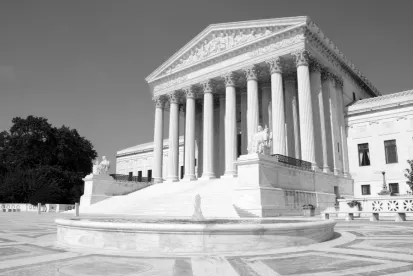And welcome back! October Term 2017 got underway this morning with argument in Epic Systems Corp. v. Lewis (No. 16-285), a case concerning the enforceability of individual arbitration clauses in employment contracts. That could be a case of great significance to the employment and class-action bars. But for the labor lawyers out there, there was even bigger news late last week, when the Court granted cert in Janus v. American Federation of State, Municipal and County Employees (No. 16-1466), the third recent case seeking to overturn Abood v. Detroit Board of Education (1977) and establish that public-sector "agency shop" arrangements (where public employees are required to pay certain union dues even if they opt out of the union) violate the First Amendment. True fans will remember that, four terms ago in Harris v. Quinn (2013), the conservative justices came awfully close to overruling Abood, but concluded that the state-contracted home-healthcare workers at issue weren't true "public employees." Union opponents then got to work finding a case that would present the opportunity to revisit Abood and found it in Friedrichs v. California Teachers Association (2016). However, with the unexpected passing of Justice Scalia, Friedrichs ended up as one of the term's 4-4 summary affirmances, leading union supporters to breathe a sigh of relief, since Barack Obama still had almost a year left in office to appoint a successor. But somehow, here we are eighteen months later with a 5-4 conservative majority once more, and it's looking like the agency shop's time is nigh.
Janus was one of eleven new cases granted cert during the Court's annual "long conference," when it addresses the petitions that have piled up over the summer. The others are:
Dalmazzi v. United States (No. 16-961) (consolidated with Cox v. United States (No. 16-1017) and Ortiz v. United States (No. 16-1423)), which raise questions concerning the propriety of active duty military officers serving on the U.S. Court of Military Commission Review, in light of post-Civil War statute requiring express authorization from congress before an active-duty military officer may hold a "civil office";
Collins v. Virginia (No. 16-1027), which asks whether the Fourth Amendment's automobile exception permits a police officer, uninvited and without a warrant, to enter private property, approach a home, and search a vehicle parked a few feet from the house;
Hall v. Hall (No. 16-1150), which asks whether the rule announced in Gelboim v. Bank of America (2015) (that a district court order dismissing the only claim in a case that has been consolidated with other actions for pretrial proceedings in multidistrict litigation is final and appealable) should also be applied to cases consolidated in single-district litigation;
Encino Motorcars v. Navarro (No. 15-1362), which asks (again, see Encino Motorcars v. Navarro (2016)) whether service advisors at car dealerships are exempt from the Fair Labor Standards Act's overtime-pay requirements;
Byrd v. United States (No. 16-1371), which asks whether a driver has a reasonable expectation of privacy in a rental car when he has the renter's permission to drive it but is not listed as an authorized driver on the rental agreement;
Hays v. Vogt (No. 16-1495), which asks whether the Fifth Amendment is violated when statements are used at a probable cause hearing, but not a criminal trial;
McCoy v. Louisiana (No. 16-8255), which asks whether it is unconstitutional for defense counsel to concede a defendant's guilt over the defendants' express objection; and
Rosales-Mireles v. United States (16-9493), which asks whether the Fifth Circuit applied too onerous a standard for establishing plain error under United States v. Olano (1993) when it held that it is necessary for an unpreserved error to "shock the conscience of the common man, serve as a powerful indictment against our system of justice, or seriously call into question the competence of integrity of the district judge."
Those cases will be joining a docket that is already jam-packed with potential blockbusters on partisan gerrymandering, voting rights, religious freedom (or the right to discriminate, depending on your angle), cell-phone privacy, sports betting, and more. But, as you might have read, one erstwhile blockbuster has been dropped from the calendar, at least for now. The justices canceled the scheduled October 10th argument on the "travel ban" in light of the Trump Administration's announcement of a replacement policy. The case hasn't been removed from the docket, but the Court asked the parties to weigh in on how the revised policy impacts, or potentially moots, the appeal. It seems fair to assume that some version of the travel ban will come before the Court before long, perhaps even this year. But even without it, OT17 already looks to be a heavyweight—and, with a full roster of justices, decisive—term.





 />i
/>i

